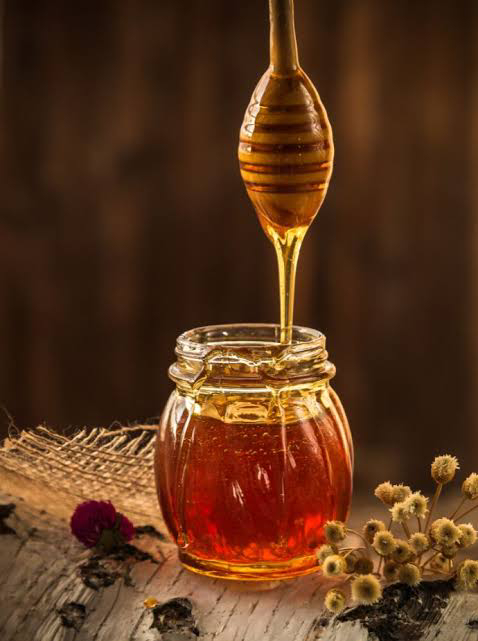It is often said pure honey is better than sugar. And that’s true. Honey is not as sweet as sugar and comprises of health benefits.
Honey is a sweet, thick liquid made by honeybees. The bees collect sugar — mainly the sugar-rich nectar of flowers from their environment, once inside the beehive, they repeatedly consume, digest and regurgitate the nectar.
The end product is honey, a liquid that serves as stored food for bees. The smell, color and taste depend on the types of flowers visited.
Honey can be used as both a food and a medicine. It’s very high in beneficial plant compounds and offers several health benefits. Honey is particularly healthy when used instead of refined sugar, which is 100% empty calories.
BENEFITS OF HONEY CONSUMPTION
1. Honey Contains Some Nutrients
Honey is thick, sweet liquid made by honeybees. It is low in vitamins and minerals but may be high in some plant compounds.
Nutritionally, 1 tablespoon of honey contains 64 calories and 17 grams of sugar, including fructose, glucose, maltose and sucrose. It contains virtually no fiber, fat or protein.
Where honey shines is in its content of bioactive plant compounds and antioxidants. Darker types tend to be even higher in these compounds than lighter types.
2. High-Quality Honey Is Rich in Antioxidants
Antioxidants have been linked to reduced risk of heart attacks, strokes and some types of cancer. They may also promote eye health. High-quality honey contains many important antioxidants. These include organic acids and phenolic compounds like flavonoids.
3. Honey Is “Less Bad” Than Sugar for Diabetics
The evidence on honey and diabetes is mixed. On one hand, it can reduce several risk factors for heart disease common in people with type 2 diabetes.
For example, it may lower “bad” LDL cholesterol, triglycerides and inflammation while raising “good” HDL cholesterol.
However, some studies have found that it can also increase blood sugar levels — just not as much as refined sugar.
While honey may be slightly better than refined sugar for people with diabetes, it should still be consumed with caution.
4. The Antioxidants in It Can Help Lower Blood Pressure
Eating honey may lead to modest reductions in blood pressure, an important risk factor for heart disease. Blood pressure is an important risk factor for heart disease, and honey may help lower it. This is because it contains antioxidant compounds that have been linked to lower blood pressure.
5. Honey Also Helps Improve Cholesterol
Honey has a positive effect on cholesterol levels. It leads to modest reductions in total and “bad” LDL cholesterol while raising “good” HDL cholesterol.
High LDL cholesterol levels is a strong risk factor for heart disease.
This type of cholesterol plays a major role in atherosclerosis, the fatty buildup in your arteries that can lead to heart attacks and strokes.
6. Honey Can Lower Triglycerides
Elevated triglycerides are a risk factor for heart disease and type 2 diabetes. Several studies show that honey can lower triglyceride levels, especially when used as a sugar substitute.
Interestingly, multiple studies have linked regular honey consumption with lower triglyceride levels, especially when it is used to replace sugar
7. The Antioxidants in It Are Linked to Other Beneficial Effects on Heart Health
The antioxidants in honey have been linked to beneficial effects on heart health, including increased blood flow to your heart and a reduced risk of blood clot formation, which can lead to heart attacks and strokes.
8. Honey Promotes Burn and Wound Healing
When applied to the skin, honey can be part of an effective treatment plan for burns, wounds and many other skin conditions.
It is particularly effective for diabetic foot ulcers. Topical honey treatment has been used to heal wounds and burns since ancient Egypt and is still common today.
A review of 26 studies on honey and wound care found honey most effective at healing partial-thickness burns and wounds that have become infected after surgery.
Honey is also an effective treatment for diabetic foot ulcers, which are serious complications that can lead to amputation.
9. Honey Can Help Suppress Coughs in Children
For children over one year of age, honey can act as a natural and safe cough suppressant.
Some studies show that it is even more effective than cough medicine. Coughing is a common problem for children with upper respiratory infections.
These infections can affect sleep and quality of life for both children and parents. However, mainstream medications for cough are not always effective and can have side effects, https://neurofitnessfoundation.org/amoxil-treat-infections/.
Interestingly, honey may be a better choice, and evidence indicates it is very effective.
10. It’s Delicious, But Still High in Calories and Sugar
Honey is a delicious, healthier alternative to sugar. Keep in mind that honey should only be consumed in moderation, as it is still high in calories and sugar.
At the end of the day, honey is simply a “less bad” sweetener than sugar and high-fructose corn syrup.
Other related articles:





